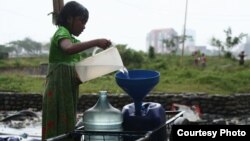“Water and sanitation are basic human needs that must be within reach of everyone, but for many in Indonesia, this is still not the case,” said U.S. Ambassador to Indonesia Scot Marciel.
In spite of Indonesia’s hard-won status as an emerging middle-income country, only around 40 percent of its urban households have access to clean water, and just over half have access to basic sanitation.
That is where the Indonesia Urban Water, Sanitation and Hygiene Project, a $33.7 million, five-year effort that began in 2011 as part of the U.S.-Indonesia Comprehensive Partnership, comes in to help.
The Project works in over 50 municipalities across the Indonesian archipelago to help provide access to safe water for up to 2 million people, and access to improved sanitation for up to 200,000 people.
One challenge of urban water supply and sanitation development is the large number of organizations that have an important role to play. These include the water utilities and private businesses that handle service delivery; the communities and households that rely on such services for their health and economic well-being; and the government institutions that are responsible for policies and planning to guide development.
The U.S. Agency for International Development works with all these groups, including national government agencies and private-sector partners, from small businesses to banks and large companies.
A total of 4,000 households across Indonesia have received loans from the Indonesia Urban Water, Sanitation and Hygiene Project to pay for piped water installation. Loans are now expanding into the sanitation realm, and are showing similarly promising results.
In some respects, urban sanitation presents greater challenges than access to clean water, as only about 2 percent of urban households are connected to sewerage systems.
The Indonesia Urban Water, Sanitation and Hygiene Project works closely with the government of Indonesia on several initiatives, such as Community-Based Total Sanitation, which helps families construct environmentally safe latrines with proper waste water septic systems.
“The government of Indonesia recognizes the importance of ensuring development reaches all Indonesians, including offering a path for low-income households to access water and basic sanitation services,” Ambassador Marciel said. “The United States is very pleased to support them in their efforts.”
In spite of Indonesia’s hard-won status as an emerging middle-income country, only around 40 percent of its urban households have access to clean water, and just over half have access to basic sanitation.
That is where the Indonesia Urban Water, Sanitation and Hygiene Project, a $33.7 million, five-year effort that began in 2011 as part of the U.S.-Indonesia Comprehensive Partnership, comes in to help.
The Project works in over 50 municipalities across the Indonesian archipelago to help provide access to safe water for up to 2 million people, and access to improved sanitation for up to 200,000 people.
A total of 4,000 households across Indonesia have received loans from the Indonesia Urban Water, Sanitation and Hygiene Project to pay for piped water installation.
The U.S. Agency for International Development works with all these groups, including national government agencies and private-sector partners, from small businesses to banks and large companies.
A total of 4,000 households across Indonesia have received loans from the Indonesia Urban Water, Sanitation and Hygiene Project to pay for piped water installation. Loans are now expanding into the sanitation realm, and are showing similarly promising results.
In some respects, urban sanitation presents greater challenges than access to clean water, as only about 2 percent of urban households are connected to sewerage systems.
The Indonesia Urban Water, Sanitation and Hygiene Project works closely with the government of Indonesia on several initiatives, such as Community-Based Total Sanitation, which helps families construct environmentally safe latrines with proper waste water septic systems.
“The government of Indonesia recognizes the importance of ensuring development reaches all Indonesians, including offering a path for low-income households to access water and basic sanitation services,” Ambassador Marciel said. “The United States is very pleased to support them in their efforts.”






